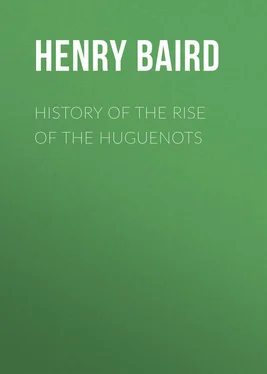Henry Baird - History of the Rise of the Huguenots
Здесь есть возможность читать онлайн «Henry Baird - History of the Rise of the Huguenots» — ознакомительный отрывок электронной книги совершенно бесплатно, а после прочтения отрывка купить полную версию. В некоторых случаях можно слушать аудио, скачать через торрент в формате fb2 и присутствует краткое содержание. ISBN: , Жанр: foreign_antique, foreign_prose, на английском языке. Описание произведения, (предисловие) а так же отзывы посетителей доступны на портале библиотеки ЛибКат.
- Название:History of the Rise of the Huguenots
- Автор:
- Жанр:
- Год:неизвестен
- ISBN:http://www.gutenberg.org/ebooks/30708
- Рейтинг книги:4 / 5. Голосов: 1
-
Избранное:Добавить в избранное
- Отзывы:
-
Ваша оценка:
- 80
- 1
- 2
- 3
- 4
- 5
History of the Rise of the Huguenots: краткое содержание, описание и аннотация
Предлагаем к чтению аннотацию, описание, краткое содержание или предисловие (зависит от того, что написал сам автор книги «History of the Rise of the Huguenots»). Если вы не нашли необходимую информацию о книге — напишите в комментариях, мы постараемся отыскать её.
History of the Rise of the Huguenots — читать онлайн ознакомительный отрывок
Ниже представлен текст книги, разбитый по страницам. Система сохранения места последней прочитанной страницы, позволяет с удобством читать онлайн бесплатно книгу «History of the Rise of the Huguenots», без необходимости каждый раз заново искать на чём Вы остановились. Поставьте закладку, и сможете в любой момент перейти на страницу, на которой закончили чтение.
Интервал:
Закладка:
Condé's justification.
No sooner had the Prince of Condé established himself upon the banks of the Loire, than he took measures to explain to the world the necessity and propriety of the step upon which he had ventured. He wrote, and he induced the Protestant ministers who were with him to write, to all the churches of France, urging them to send him reinforcements of troops and to fill his empty treasury. 79 79 April 7th. Mém. de Condé, iii. 221; Hist. ecclés. des égl. réf., ii., 9; J. de Serres, ii. 58, 59; De Thou, iii. 139. The historian of the reformed churches, as well as Beza in his letter of March 28th (Baum, ii., App., 176), complains bitterly of the slowness and parsimony of the Parisian Protestants, who seemed to be unable to understand that war was actually upon them.
At the same time he published a "declaration" in justification of his resort to arms. He recapitulated the successive steps that revealed the violent purposes of the triumvirs – the retreat of the Guises and of the constable from court, Nemours's attempt to carry the Duke of Orleans out of the kingdom, the massacre at Vassy, Guise's refusal to visit the royal court and his defiant progress to the capital, the insolent conduct of Montmorency and Saint-André, the pretended royal council held away from the king, the detention of Charles and of his mother as prisoners. And from all these circumstances he showed the inevitable inference to be that the triumvirs had for one of their chief objects the extirpation of the religion "which they call new," "either by open violence or by the change of edicts, and the renewal of the most cruel persecutions that have ever been exercised in the world." It was not party interest that had induced him to take up arms, he said, but loyalty to God, to his king, and to his native land, a desire to free Charles from unlawful detention, and a purpose to insist upon the execution of the royal edicts, especially that of January, and to prevent new ministers of state from misapplying the sums raised for the payment of the national debts. He warned all lovers of peace not to be astonished at any edicts that might emanate from the royal seal so long as the king remained a prisoner, and he begged Catharine to order the triumvirs to lay down their arms. If they did so, he declared that he himself, although of a rank far different from theirs, would consent to follow their example. 80 80 April 8th. "Déclaration faicte par M. le prince de Condé, pour monstrer les raisons qui l'ont contraint d'entreprendre la défence de l'authorité du Roy," etc. Mém. de Condé, iii. 222-235; Jean de Serres, ii. 42-57; Hist. ecclés. des égl. réf., ii. 9, 10; De Thou, iii. 139-141.
Stringent articles of association.
The Huguenots had thrown off the shackles which a usurping party about the king endeavored to fasten upon them; but they had not renounced the restraints of law. And now, at the very commencement of a great struggle for liberty, they entered into a solemn compact to banish licentious excesses from their army. Protesting the purity of their motives, they swore to strive until the king's majority to attain the objects which had united them in a common struggle; but they promised with equal fervor to watch over the morals of their associates, and to suffer nothing that was contrary to God's honor or the king's edicts, to tolerate no idolatrous or superstitious practices, no blasphemy, no uncleanness or theft, no violation of churches by private authority. They declared their intention and desire to hear the Word of God preached by faithful ministers in the midst of the camps of war. 81 81 Traicté d'association, etc., April 11th. Mém. de Condé, iii. 258-262; J. Serres, ii. 31-37; De Thou, iii. 141.
Huguenot nobles and cities.
The papal party was amazed at the opposition its extreme measures had created. In place of the timid weakling whom the triumvirate had expected, they saw a giant spring from the ground to confront them. 82 82 See Pasquier's letter to Fonssomme, already referred to, which contains a vivid picture of the confusion reigning in Paris, the surprise of the papal party, and the delight of the untrained populace at the prospect of war. Œuvres (ed. Feugère), ii. 246-250.
To Orleans flocked many of the highest nobles of the land. Besides Condé – after Navarre and Bourbon, the prince of the blood nearest to the crown – there were gathered to the Protestant standard the three Châtillons, Prince Porcien, Count de la Rochefoucauld, the Sieurs de Soubise, de Mouy, de Saint Fal, d'Esternay, Piennes, Rohan, Genlis, Grammont, Montgomery, and others of high station and of large influence and extensive landed possessions. 83 83 Mém. de Castelnau, liv. iii., c. 8.
And, what was still more important, the capture of Orleans was but the signal for a general movement throughout France. In a few weeks the Huguenots, rising in their unsuspected strength, had rendered themselves masters of cities in almost every province. Along the Loire, Beaugency, Blois, Tours, and Angers declared for the Prince of Condé; in Normandy, Rouen, Havre, Dieppe, and Caen; in Berry and the neighboring provinces, Bourges, La Rochelle, Poitiers; along the Saône and Rhône, Châlons, Mâcon, Lyons, Vienne, Valence, Montélimart, Tournon, Orange; Gap and Grenoble in Dauphiny; almost the whole of the papal "Comtât Venaissin;" the Vivarais; the Cevennes; the greater part of Languedoc and Gascony, with the important cities of Montauban, Castres, Castelnaudary, Beziers, Pézénas, Montpellier, Aiguesmortes, and Nismes. 84 84 Ibid., liv. iii., c. 9.
In northern France alone, where the number of Protestants was small, the Huguenots obtained but a slight foothold. 85 85 Even so late as May 8, 1562, the English minister resident at the court, than whom probably no other person in France felt obliged to keep himself better informed, wrote to Cecil respecting the Prince of Condé's strength: "I can assur you att thys dyspatche he ys the strongest partie , and in suche state his matter standeth, that these men [the court] wold fayne have a reasonable end, thoughe yt were with some dishonnour ." MSS. State Paper Office, Duc d'Aumale, Princes de Condé, Pièces justif., i. 370.
Can iconoclasm be repressed?
In the midst of this universal movement there was one point in the compact made by the confederates at Orleans, which it was found impossible to execute. How could the churches, with their altars, their statues, their pictures, their relics, their priestly vestments, be guaranteed from invasion? To the Huguenot masses they were the temples and instruments of an idolatrous worship. Ought Christians to tolerate the existence of such abominations, even if sanctioned by the government? It was hard to draw a nice line of distinction between the overthrow of idolatry by public authority and by personal zeal. If there were any difference in the merit of the act, it was in favor of the man who vindicated the true religion at the risk of his own life. Nay, the Church itself had incontrovertibly given its sanction to this view by placing among the martyrs those primitive Christians who had upon their own responsibility entered heathen temples and overthrown the objects of the popular devotion. In those early centuries there had been manifested the same reckless exposure of life, the same supreme contempt for the claims of art in comparison with the demands of religion. The Minerva of Phidias or Praxiteles was no safer from the iconoclastic frenzy of the new convert from heathenism than the rude idol of a less cultivated age. The command, "Thou shalt not make unto thee any graven image," had not excepted from its prohibition the marvellous products of the Greek chisel.
It was here, therefore, that the chief insubordination of the Huguenot people manifested itself – not in licentious riot, not in bloodshed, not in pillage. Calvin, with his high sense of law and order, might in his letters reiterate the warnings against the irregularity which we have seen him uttering on a previous occasion; 86 86 It is strange that a historian at once so conscientious and generally so well-informed as M. Rosseeuw Saint-Hilaire should, in his Histoire d'Espagne, ix. 60, 61, have made the grave mistake of holding Calvin responsible for the excesses of the iconoclasts. See the Bulletin, xiv. 127, etc., for a complete refutation.
the ministers might threaten the guilty with exclusion from the ordinances of the Church; Condé might denounce the penalty of death. The people could not restrain themselves or be restrained. They must remove what had been a stumbling-block to them and might become a snare to others. They felt no more compunction in breaking an image or tearing in pieces a picture, than a traveller, whom a highwayman has wounded, is aware of, when he destroys the weapons dropped by his assailant in his hurried flight. Indeed, they experienced a strange satisfaction in visiting upon the lifeless idol the punishment for the spiritual wrongs received at the hands of false teachers of religion. 87 87 Like the undeceived dupe in the old Athenian comedy, who mournfully laments that he had been led to worship a bit of earthenware as a god: Οἴμοι δείλαιος, Ὅτε καὶ σὲ χυτρεοῦν ὄντα θεὸν ἡγησάμην. (Aristophanes, Clouds, 1473, 1474.) On the other hand, the zealous Roman Catholic had his arguments for the preservation and worship of images, some of which may strike us as sufficiently whimsical. "I confess," says one, "that God has forbidden idols and idolatry, but He has not forbidden the images (or pictures) which we hold for the veneration of the saints. For if that were so, He would not have left us the effigy of his holy face painted in His likeness, on the cloth which that good lady Veronica presented Him, which yet to-day is looked upon with so much devotion in the church of St. Peter at Rome, nor the impression of His holy body represented in the 'saint suaire' which is at Chambéry. Is it not found that Saint Luke thrice made with his own hand the portrait of Our Lady?.. That holy evangelist ought certainly to have known the will of his Lord and Master better than you, my opponent, who wish to interpret the Scripture according to your sensuality." Discours des Guerres de Provence (Arch. curieuses, iv. 501, 502). Of course, the author never dreamed that his facts might possibly be disputed.
Интервал:
Закладка:
Похожие книги на «History of the Rise of the Huguenots»
Представляем Вашему вниманию похожие книги на «History of the Rise of the Huguenots» списком для выбора. Мы отобрали схожую по названию и смыслу литературу в надежде предоставить читателям больше вариантов отыскать новые, интересные, ещё непрочитанные произведения.
Обсуждение, отзывы о книге «History of the Rise of the Huguenots» и просто собственные мнения читателей. Оставьте ваши комментарии, напишите, что Вы думаете о произведении, его смысле или главных героях. Укажите что конкретно понравилось, а что нет, и почему Вы так считаете.












